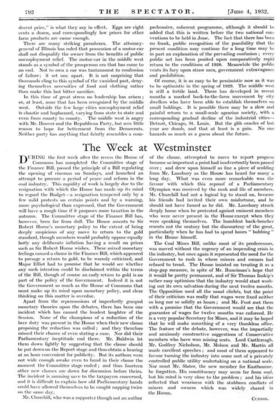The Week at Westminster
DURING the first week after the recess the House of Commons has completed the Committee stage of the Finance Bill, passed the principle of a Bill regulating the opening of cinemas on Sundays, and launched an attempt to procure a period of peace and reform in the coal industry. This rapidity of work is largely due to the resignation with which the House has made up its mind to regard the Budget—a resignation tempered only by a few mild protests on certain points and by a warning, more psychological than expressed, that the Government will have a rough time if it proposes more taxation in the autumn. The Committee stage of the Finance Bill has, however, been far from dull. The House assents to Sir Robert Horne's monetary policy to the extent of being deeply suspicious of any move to return to the gold standard, though members would probably oppose equally hotly any deliberate inflation having a result on prices such as Sir Robert Home wishes. These mixed monetary feelings caused a clause in the Finance Bill; which appeared to presage a return to gold, to be warmly criticized, and Major Elliot had to promise that he would see whether any such intention could be disclaimed within the terms of the Bill, though of course an early return to gold is no part of the policy of the Government. Indeed it is not the Government so much as the House of Commons that must make up its mind upon monetary policy, and clear thinking on this matter is overdue.
Apart from the repercussions of imperfectly grasped monetary theories upon the debates, there has been one incident which has caused the loudest laughter of the Session. None of the champions of a reduction of the beer duty was present in the House when their new clause proposing the reduction was called ; and they therefore missed their chance of even stating a case. Nor did their Parliamentary ineptitude end there. Mr. Baldwin let them down lightly by suggesting that the clause should be put down on the Report stage and thus obtain a hearing at an hour convenient for publicity. But its authors were not wide enough awake even to hand in their clause the moment the Committee stage ended ; and thus fourteen other new clauses are down for discussion before theirs. The incident is amusing save to the taxpayers concerned, and it is difficult to explain how old Parliamentary hands could have allowed themselves to be caught napping twice on the same day.
Mr. Churchill, who was a supporter though not an- author of the clause, attempted to move to report progress because so important a point had inadvertently been passed over ; and drew upon himself as fine a piece of scolding from Mr. Lansbury as the House has heard for many a long day. What was even more remarkable was the favour with which this reproof of a Parliamentary Olympian was received by the rank and file of members. Mr. Churchill had not a logical leg to stand on, because his friends had invited their own misfortune, and he should not have fumed as he did. Mr. Lansbury struck deeply home when he protested against eminent members who were never present in the House except when they were speaking themselves. The humblest back-bencher resents not the oratory but the discourtesy of the great, particularly when he has had to spend hours " bobbing " in the House himself.
The Coal Mines Bill, unlike most of its predecessors, was moved without the urgency of an impending crisis in the industry, but once again it represented the need for the Government to rush in where miners and owners had refused to tread. The House insisted on treating it as a stop-gap measure, in spite of Mr. Runciman's hope that it would be pretty permanent, and of Sir Thomas Inskip's rather easy optimism that the industry would start work- ing out its own salvation during the next twelve months. The Opposition used all the usual cliches, but the point of their criticism was really that wages were fixed neither so long nor so solidly as hours ; and Mr. Foot met them with a promise that the Government would see that the guarantee of wages for twelve months was enforced. He is a very popular Secretary for Mines, and it may be hoped that he will make something of a very thankless office. The feature of the debate, however, was the impartially and anxiously constructive suggestions of Conservative members who have won mining seats. Lord Castlereagh, Mr. Godfrey Nicholson, Mr. Molson and Mr. Martin all made excellent speeches ; and most of them appeared to favour turning the industry into some sort of a privately controlled public utility undertaking on a national scale. Nor must Mr. Slater, the new member for Eastbourne, be forgotten. His constituency may seem far from coal, but his mind is very close to the problem ; and his ideas reflected that weariness with the stubborn conflicts of miners and owners which was widely shared in the House.
CUSTOS.




































 Previous page
Previous page